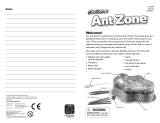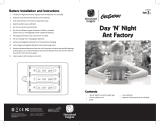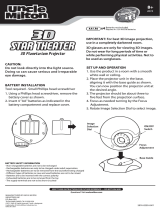
1465-0250-0812-V01
3. The ants may seem inactive for the rst few hours. That is
because they are not yet used to their new home. In a few days
you should begin see some tunnels. On average, your ants will
live one to three months.
Restocking Your Ant Farm Revolution Habitat
If you want to put new ants in your habitat, remove as many of the
original occupants as possible. Also remove as much litter as you
can. There is no need to add new gel. The new ants will explore
existing tunnels and build new ones. Please visit
www.unclemilton.com for information on ordering ants.
Don’t Start a War!
Don’t ever mix your ants or you will start a war. While ants in a
colony are very cooperative with each other, they will ght with
ants from another colony. The ants we send you will all be from the
same colony, so they will all get along.
If you gather your own ants, be sure they all come from the same
place or they will ght. When you nd a big group of ants all living
and working together, they are most likely from the same colony.
Don’t Bake Your Ants!
When the sun shines directly on your ant habitat it becomes like an
oven, and your ants could perish from the heat. Keep the habitat
away from any window where the sun shines directly on it.
Don’t freeze your ants either, by leaving the habitat outside in cold
weather. Ants don’t like extremes in temperature. A room
temperature between 68˚ to 72˚F (20˚ to 22˚C) is ideal.
Ants Are Neat
Ants are very clean creatures. You will see them grooming themselves
and each other. They use sti hairs on their forelegs like brushes to
clean their antennae, heads and other parts of their bodies. While
cleaning themselves and each other, they leave a scent that identies
members of the same colony. Ants can tell the dierence between a
nest mate and an unwelcome visitor by their scent.
Ants do not allow litter to pile up inside their nest. All the waste
from the colony is gathered up regularly and hauled away by
nest-keeping ants to a dump site.
Ants Are Industrious
Each ant in a colony has its own special job, and every job is
important. Deep below the surface of a natural nest, nurse ants
take care of the queen, eggs and larvae, nest-builders dig tunnels
and chambers, and nest-keepers keep the nest clean. On the
surface, guard ants patrol for predators and foragers gather food.
In some species, the younger ants work underground and the
older ones work on the surface. In other species, dierent sized
ants do dierent jobs: smaller ants work inside the nest, caring for
the queen, eggs and larvae, middle-sized ants do nest-building
and most of the foraging for food, and the largest ants are guards
protecting the colony from predators and invading ants.
If extra workers are needed for a really big job, ants might switch
from one task to another. For instance, if foragers nd a good food
source, some of the builders underground will stop digging and
come up to help. If there is a particularly dicult underground
tunneling project to complete, some of the outside foragers will
come down to assist.
Ants Are Strong
Ants are incredibly strong for their size. An ant is able to pick up
objects up to fty times its own weight and carry it in its mandibles
for long distances. That would be like an average-sized human
carrying a ve-ton boulder across the neighborhood by his teeth!
For extra-heavy loads, ants work in teams. Ants are also very speedy
creatures. If you could run as fast as an ant can for its size, you
would be able to sprint twice as fast as the world’s fastest human!
Ants Are Good for the Environment
Ants perform many important functions in the world’s ecosystems.
They are exceptional earth movers. Ants enrich, irrigate and aerate
more soil than any other animal in the world, including
earthworms. Ants are major recyclers of organic waste. Also, ants
are a major food source for many animals like birds, reptiles and
amphibians.
BATTERY SAFETY INFORMATION
• Non-rechargeable batteries are not to be recharged
• Rechargeable batteries are only to be charged under adult supervision
• Rechargeable batteries are to be removed from the toy before being charged
• Different types of batteries or new and used batteries are not to be mixed
• Batteries are to be inserted with the correct polarity
• Exhausted batteries are to be removed from the toy
• The supply terminals are not to be short-circuited
KEEP THESE INSTRUCTIONS FOR FUTURE REFERENCE — DO NOT DISCARD
Questions? Visit unclemilton.com
MANUFACTURED BY UNCLE MILTON INDUSTRIES, INC.
P.O. Box 6281
THOUSAND OAKS, CA 91359 USA
©2012 UMI. All rights reserved.
®
and
TM
designate
trademarks of Uncle Milton Industries, Inc.
Product colors and styles may vary.
MADE IN CHINA







